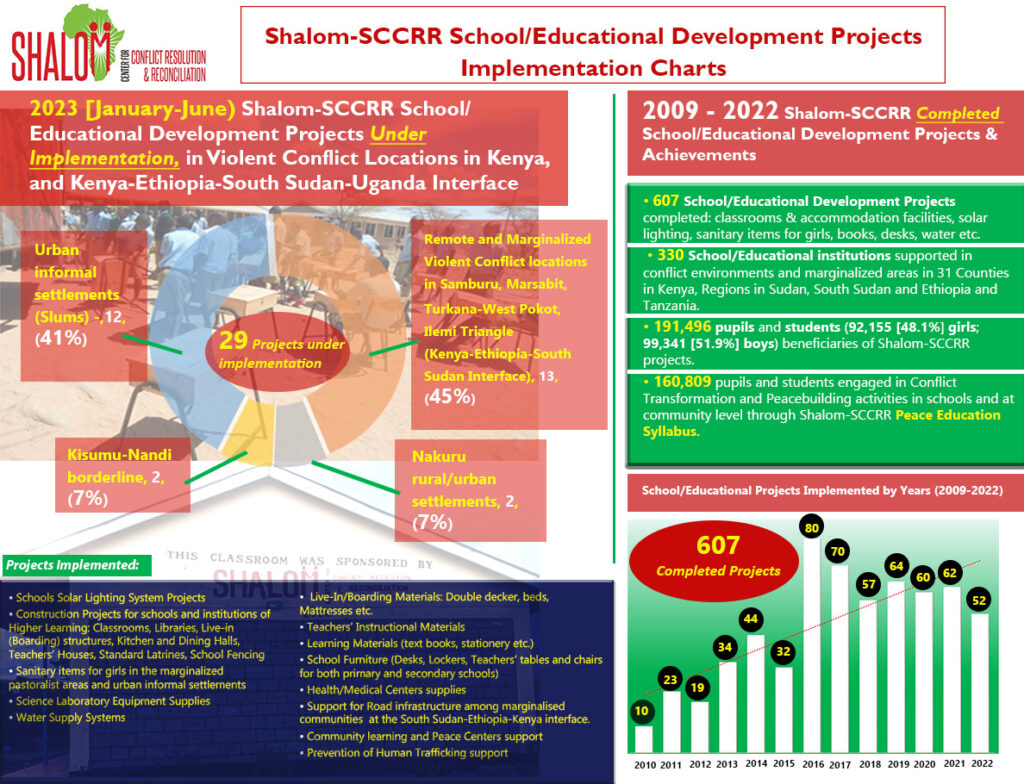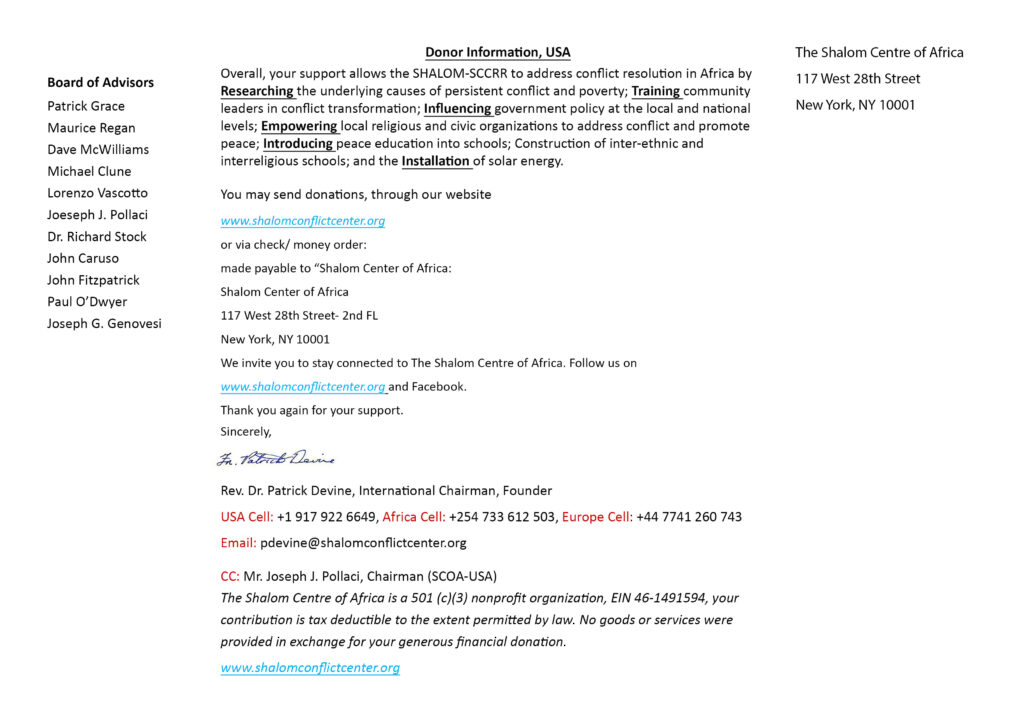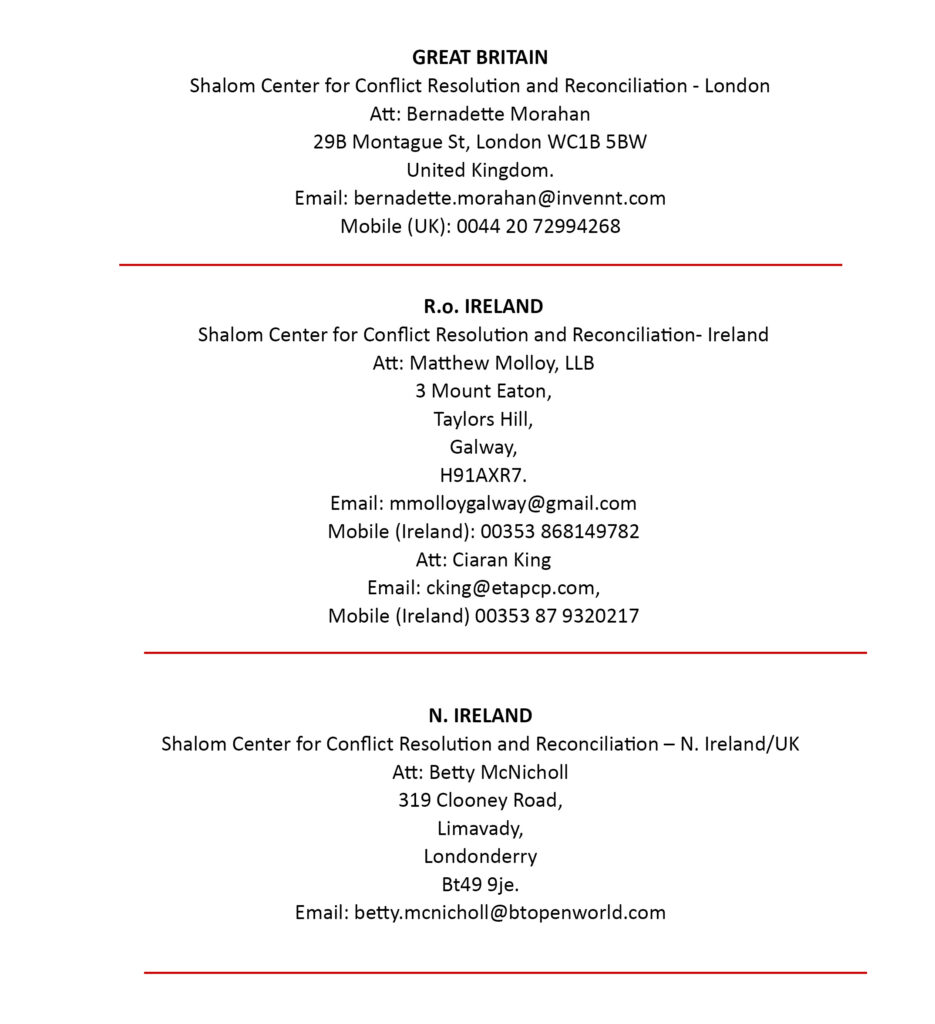
Impact of Shalom-SCCRR School/Educational Development Interventions
Over the past 13 years, Shalom-SCCRR School/Educational Development interventions are evidenced in 600+ Projects and 300+ Educational Institutions, empowering more than 190,000 Pupils/Students. Most of these institutions are located in environments that have suffered from frequent and long-standing inter-ethnic and in some instances inter-religious conflicts, and gender-based violence against women and children. In the 36 conflict environments where Shalom-SCCRR works consistently, the communities experienced marginalization from mainstream educational infrastructure development.
Shalom-SCCRR Baseline Assessments established the following:
- In arid and semi-arid areas, schools are scarce and the existing ones have run-down structures
- There are serious safety concerns for learners due to frequent violent inter-ethnic conflicts
- Learners cover long distances to reach school and have to pass through dangerous terrains
- A good number of schools lack standard toilets/sanitary and hygiene facilities
- Pupils/textbook ratio in most schools is below average
- Most schools lack adequate desks, lockers, tables for pupils/students and teachers
- Unequal distribution of educational resources compared to the developed parts of the country has affected the learners’ morale, potential and performance
- Girls face insurmountable barriers such as extreme poverty, negative cultural practices thus largely missing education opportunities
- Early marriages are a major cause of high drop-out rates of girls from the upper primary and secondary school levels.
Shalom-SCCRR peacebuilding, development and human rights interventions are designed based on empirical research and baseline findings which are the authoritative voice of the people. With the beneficiary communities, we design ‘Results Frameworks’ from which intervention outcomes are monitored and evaluated through a participatory process.
Our Impact Assessments indicate that:
Classroom construction and renovation projects have improved pupil enrolment, enhanced learner concentration, boosted teacher morale and fostered a culture of sustainable peace and development because of the conducive teaching and learning environment.
Construction of standard toilets and other sanitary facilities has significantly improved the pupil-toilet ratio, which has helped in containing related illnesses.
Provision of sanitary items has enhanced girls’ menstrual hygiene management, and contributed to a reduction in school absenteeism thus positively affecting their academic performance.
According to a UNESCO Institute of Statistics report (2021), nearly 1.8 million children and adolescents aged 6-17 years were out of school in Kenya. Shalom-SCCRR school/educational development projects are directly addressing this problem by enhancing the school/educational infrastructure, providing learning-teaching materials, a peace syllabus etc. More importantly, we are constantly engaging communities in these violent conflict environments through inter-communal peace initiatives as well as joint and sustainable community development projects.
The nexus of Shalom-SCCRR’s Conflict Transformation, Peacebuilding and School/Educational Development interventions impact over the past 13 years are summarized in some of the following significant outcomes:
- Reduction of inter-ethnic based violent conflict incidents by an average of 67% in Shalom-SCCRR engaged project areas.
- Operational and effective locally developed and sustained Conflict Early Warning and Response Mechanisms preventing more than 60% of looming conflicts.
- More women participation as negotiators in peace processes among traditional ethnic communities (43% participation) in contexts where peace processes have been a preserve of the male-folk.
- Improved peace and security by 58% in areas where Shalom-SCCRR is intervening based on the monthly conflict incidents tracking. Thus, creating a supportive environment for development of local economy, stable and safe human settlement, health centers, and other social facilities.
- 90% success of uninterrupted learning in schools where Shalom-SCCRR is implementing conflict transformation and peacebuilding projects.
- Improved levels of trust, cooperation and collaboration between rival ethnic communities leading to joint development in areas such as: education, and livelihood activities.
- Prevented youth radicalization and religious ideological extremism in the urban slums through broad stakeholder engagement and capacity building trainings to local communities’ key influential opinion shapers, religious leaders, local government administrators and civil society actors.
Shalom/Educational Development Projects while being an outcome dividend of Shalom-SCCRR conflict transformation and peacebuilding interventions, their existence in turn stabilizes and further promotes the road maps of sustainable peace and development.
Our Gratitude
Shalom-SCCRR is grateful to all the donors, partners and stakeholders who continue to support our peacebuilding, peace education, school/educational and community development projects. This support has continued to strengthen Shalom-SCCRR’s dedication and professionalism in working towards generating interdependent peaceful coexistence among conflicting communities, and implementing development projects for sustainable positive peace in Eastern Africa.
Mr. Francis Mwangi, MA – Shalom-SCCRR Monitoring, Evaluation, Research and Learning Officer (MERL)
Ms. Esther Kibe, MA – Shalom-SCCRR, Women’s Project Officer & Communications Department
Rev. Dr. Patrick. R. Devine – Shalom-SCCRR International Executive Chairman-Founder, Project Coordinator of Patrons and Promoters
Rev. Oliver Noonan, MA (Ph.D. Candidate) – Shalom-SCCRR Executive Director
Mr. Godfrey Okoth, MA – Shalom-SCCRR Director of Programs




